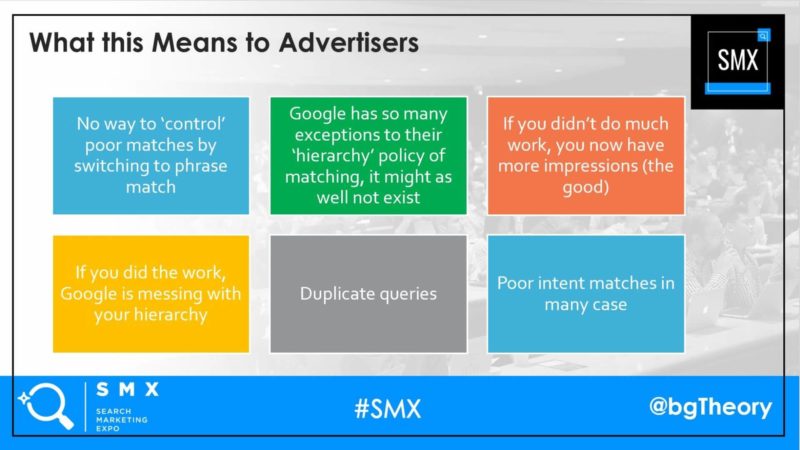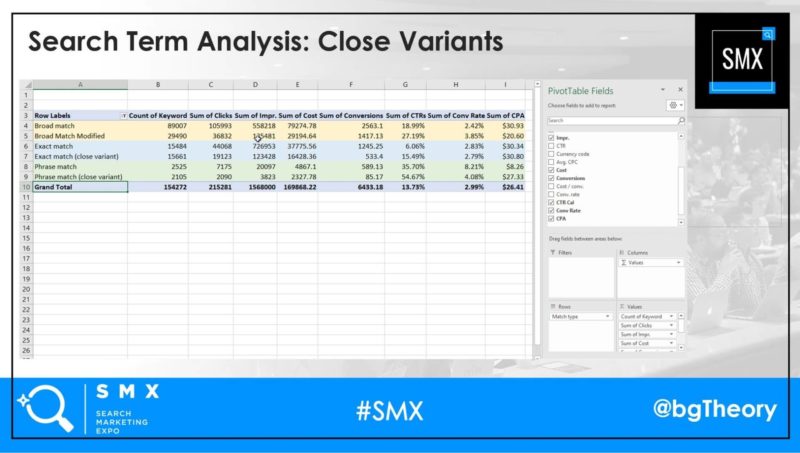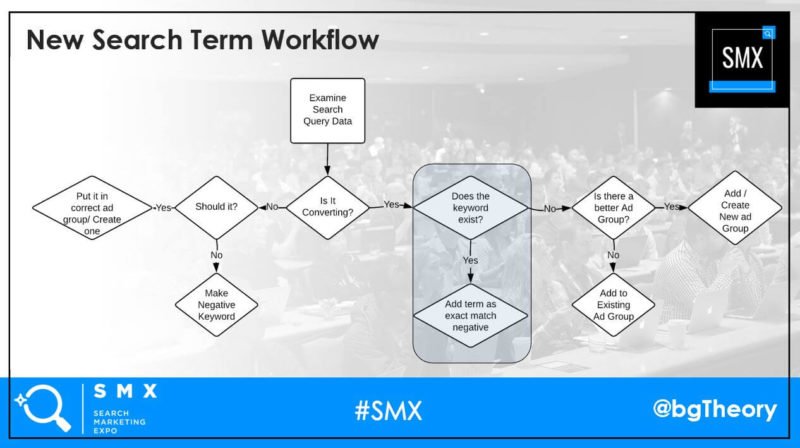How to manage search terms in the new match type world
A look by Brad Geddes at the impact of close variants updates and the analysis and workflow necessary to maintain control and conversions.
With the ongoing changes to close variants in Google Ads, paid search marketers have had to adjust their keyword management strategies. Brad Geddes, paid search veteran and co-founder of ad testing platform AdAlysis, shared several examples of how these changes have impacted accounts and offered several tips for managing search terms in a new match type world at SMX East last month.
If you’ve done a lot of work in your accounts in the wake of exact match close variants changes to tightly manage keyword-to-query matching, you may have noticed that Google isn’t respecting your hierarchy like it says it’s supposed to. “There are so many exceptions to the rule there might as well not be a hierarchy,” said Geddes.
He laid out the three primary challenges: the control that phrase match once offered is gone; Google often ignores its own hierarchy rules, resulting in duplicate queries; and there are often poor intent matches. ” When Google gets intent wrong,” said Geddes, “you don’t have a good short-term solution.”

The good news, he said, is that advertisers that didn’t work to address close variants in exact match are getting more impressions. E-commerce, travel and industries with a lot of similar adjectives and nouns, tend to fair well, too, he said. For e-commerce sites with the options on the product page (color, etc.), conversion rates don’t really suffer. If those are at the category level, though, that can be different story, Geddes noted.
The ugly
Geddes showed many examples of less-than-ideal matching since the latest change to phrase match and broad match modifier close variants. For example, the query “trademark symbol” triggered the phrase match keyword “trademark logo.” The intent of each is quite different. “Trademark symbol” searchers are looking for the symbol to copy and paste into their documents, whereas “trademark logo” searchers are looking to get their logo trademarked, Geddes noted. That’s a big difference.
The biggest change, though he said, has been in “same word substitutions.” For example, “+trademarking” triggered on the search term “register a brand,” which is not only entirely different word-wise, “register a brand” was already an exact match keyword in another ad group.
In another example, the keyword “dental +implant +cost” triggered on the search term “dentures cost,” ignoring the modifier word “+implant.”
In the most egregious cases, Geddes said, many advertisers have ended up pausing all of their phrase match keywords due to the poor performance of the substitutions Google was making. The phrase match keywords in one account, for example, went from generating 104 conversions within the target CPA a year ago to generating zero conversions this September.
Hierarchy exceptions are often the rule. Google says it will give preference to the exact match keyword in order to avoid having queries trigger keywords in multiple ad groups. However, Geddes showed several more examples of Google ignoring its hierarchy and serving ads from more than one ad group for the same query.
How to analyze the close variants’ impact
To get a high-level look at how your keywords are performing by match type and close variant, Geddes says to export year-over-year Search Term report data from periods prior to and after the change and evaluate the differences with a pivot table in Excel.
#ProTip: Geddes says to be sure to download each time period from Google Ads separately, add a date range column to each and then combine them to avoid keyword issues with the date range comparison in the UI.

“Look at CPAs [cost-per-acquisition],” said Geddes. “Many advertisers are going to see increases from higher competition, but if you see big jumps, you need to dig into the data.
Geddes also noted Levenshtein Distance and n-grams for evaluating close variants impact.
Levenshtein Distance, which Frederick Vallaeys covers and has a script for in this article, is another way to evaluate changes over time. It compares character differences between two phrases. You don’t want to do this for broad and broad match modifier, cautions Geddes, “because they’re naturally going to have wide distances.
An n-gram analysis can help you identify the substitution words Google is now using. “With n-grams, take query data and break down into 1, 2, 3-word combinations and see how often those words appear in queries,” said Geddes. “Aggregate conversion data and CPA by n-gram — just counts. Then do the same analysis for the previous year. What’s the delta between the two?” Those are the new substitution words. Do they need to be added as negatives?
Duplicate search terms are the biggest issue these days, said Geddes. Run a pivot table to identify duplicates and determine where you need to add negatives.
The new search term workflow

In the updated search term workflow that Geddes laid out, he added “Does this keyword exist?” and “Add term as an exact match negative,” to address duplications. To identify new negatives, look at the pivot tables. Need to look at CTR, conversion rate and Quality Score differences in the pivot table reports.
You may find you need to restructure your account and either add or collapse campaigns depending on the keyword-to-query relevancy. For example, “if you’re using smart bidding, Google uses campaign level data so often you want a collapsed structure,” said Geddes. “For ad groups, if your landing page and ad copy don’t change, there’s no need to separate match types into ad groups. And organizing campaigns by match types is a budget consideration, not a bid consideration.”
Contributing authors are invited to create content for Search Engine Land and are chosen for their expertise and contribution to the search community. Our contributors work under the oversight of the editorial staff and contributions are checked for quality and relevance to our readers. The opinions they express are their own.
Related stories